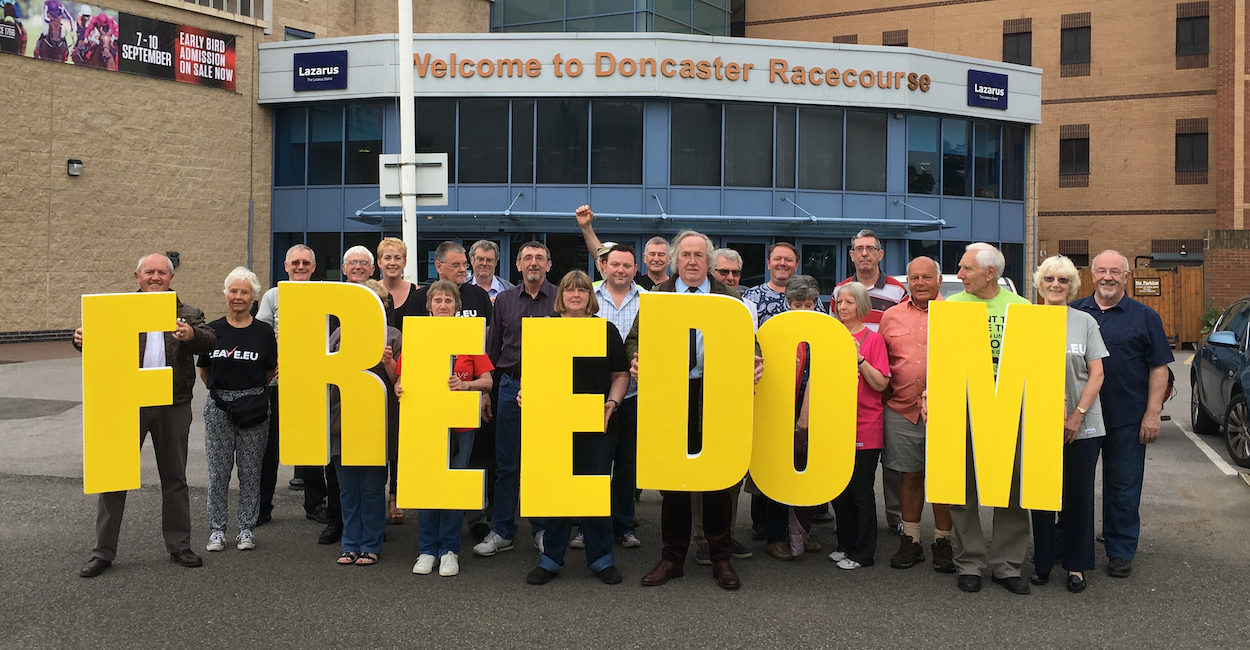By Christina Jordan – 3 minute read
THIS FRIDAY, 23rd of June, marks the seventh anniversary of the 2016 United Kingdom European Union membership referendum. The costs, to British taxpayers, of delivering the referendum was £129.1 million, with 46,500,001 people voting, a turnout of 72.21%.
Would-be brexit voters were subjected to constant lecturing, hectoring and threats, including the following:
- “I’ll have done my job if, in the end, the deal is so tough on the British that they’d prefer to stay in the EU” – Michel Barnier.
- “Brexit must be a form of punishment for deserters” – Jean-Claude Juncker
- “Brexit could be the beginning of the destruction of not only the EU but also Western political civilisation in its entirety” – Donald Tusk.
- “Voting to leave would result immediately in 500,000 job losses – an emergency budget – and collapse of the stock market” – various Remainiacs in authority.
The list was long and the tales always tall. Many of my close friends and family members were labelled racists, xenophobic, anti-immigrants, fascists and little Englanders, for daring to believe in a United Kingdom outside a political union. A union that had long ago veered away from a strictly trading lane and onto the fast lane of ever closer union. A bloated, vainglorious entity, with its own flag, anthem, laws and currency, that demanded to control everything. A power-hungry body that expected subservience and wanted its very own military machine (and still does).
Ringing in my ear, were the words of EU Commissioner, Viviane Reding, in 2012 as I helped distribute Brexit leaflets:
“the term ‘United States of Europe’ is most apt to find broad acceptance and best reflects the ultimate destination of the European Union“.
A first-generation, Asian-born, immigrant walking side by side with Labour and Tory voters, knocking on doors, talking to strangers and posting Brexit pamphlets through letterboxes. We were up against a daily stream of newspaper articles on the consequences of leaving the European Union, numerous television appearances by former and present remain-supporting politicians, celebrities extolling the virtues of the EU, and taxpayer-funded leaflets mailed to every household spelling out what Brexit would mean for the country.
Yet, we persevered.
When we are condescendingly told that we did not know what we were voting for and, therefore, need to have a rethink about brexit, and rejoin the EU, it is all par for the Remain course. Been there, heard that, read it and nagged about it, ad nauseam. Now, as before, EU diehards have the platform, money, institutions and ‘The Blob’ to keep pushing their ‘Nightmare outside EU Street’ horror stories. But now, just as they did then, they underestimate Brexit voters. In the cavernous echo chamber of remain voters, they convince themselves, and each other, that we knew not what we were voting for and that all ills are caused by Brexit.
As Brexit-supporters, we have had everything chucked at us, metaphorically and literally. But the nagging, accusations and mud-slinging did not stop us and, on 23rd June 2016, the great British public voted Out. We were not afraid of a future outside the control of the EU, and we believed in our country, even if others did not. We wanted to be free of a suffocating, bureaucratic, money-grabbing institution run by overpaid autocrats.
The UK is fortunate in that it is already a member, in its own right, of many international institutions including the G8, G20, NATO, OECD, WTO, OSCE, the Commonwealth, the Five Eyes, AUKUS and a permanent member of the United Nations Security Council. Those accusing Brexiteers of being inward-looking would do well to put aside their EU-tinted mirrors and have a good look at themselves with a plain one.
I have always found it difficult to understand how a sovereign country that produced brave, stoic, uncomplaining, unselfish, and fiercely independent, men and women who fought against tyranny in World War Two and helped secure peace could, in the 21st Century, have people who would willingly set aside hard-fought for freedoms and enthusiastically hand over our country, gift-wrapped in blue and adorned with gold stars, to an organisation sitting in, not one, but two grand buildings in two countries.
Thankfully, I am not the only one. Brexiteers are a silent lot, keeping their own counsel when EU fan club members whine about queues and the lack of tomatoes ripened by sun that apparently only shines in the EU. Many are not on social media and so, fortunately, are not exposed to the never-ending rantings of Brexit-phobes .
Yes, our brexit opportunities have been squandered. We voted, we expected, and we have been let down. Again. But, the hollow teachings of the Church of the European Union is not one we believe in or wish to follow. Theirs is not an ideology we want to return to, and I am not alone. I know of many who feel exactly the same way. I voted for #BrexitFreedoms in 2016, and I am not, and will not be, going away.
If you appreciated this article please share and follow us on Twitter here – and like and comment on facebook here. Help support Global Britain publishing these articles by making a donation here.
Christina Jordan @CJordanjb was born in Malaysia. She arrived in the UK in 1985, trained and worked as a registered general nurse before working for British Airways as cabin crew in the nineties. In 2019 she was elected as a Brexit Party MEP for South West England. Married with 2 grown-up children, Christina is a founding signatory of Don’t Divide Us.
Photo of Leave supporters in Doncaster during the 2016 referendum campaign courtesy of Brian Monteith.

